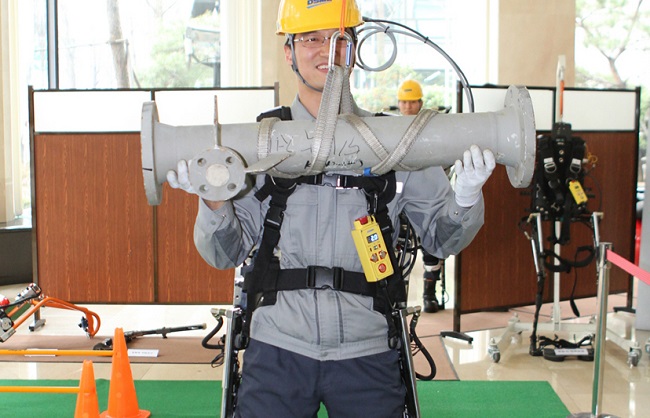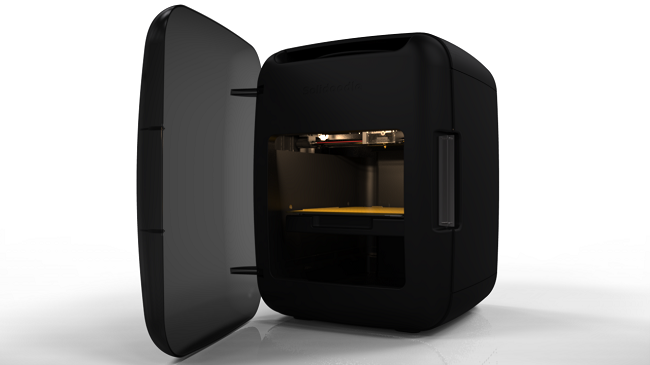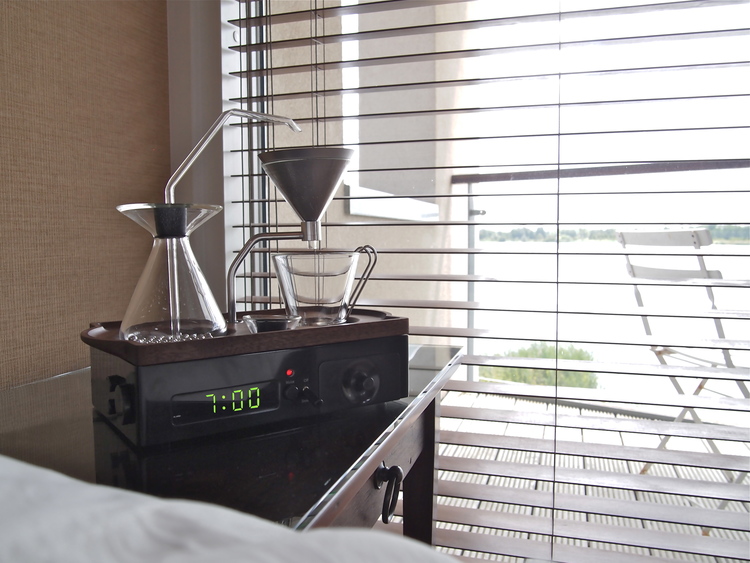Inventor Stephen Henderson with his Ruach drum concept
A look at gadget happenings, as an Irishman kick starts a drum, the first leaked images of Samsung’s Galaxy Alpha appear, and a South Korean dockyards is to use exosuits.
Ruach drumkit
Nineteen-year-old Co Down man Stephen Henderson is attempting to raise funding for his ‘drumkit in a box’, which promises to never need tuning.
The drum Henderson has developed is based off the cajon drum, a wooden drum a percussionist can sit on and play the front face with his or her hands. Now the young inventor is looking to raise stg£10,000 for his Kickstarter project.
The cajon drum’s biggest fault is considered by many to be its need for continuous retuning and is something Henderson wanted to address.
“A lot of cajons on the market are known to go out of tune, are limited to only one or two sounds, cannot be altered during a performance at all, or can even fail when retuning. This is frustrating for musicians as their performance can be ruined as a result.
“Our patented new design allows the musician to choose between five sounds that lock into position, and also contains an internal bass pedal which allows the user to be more creative with their music.”
Samsung Galaxy Alpha
Despite being close to its official unveiling, the reportedly first images of the Samsung Galaxy Alpha, in white, have been leaked online. They show little difference with the black model, depicted in photos posted not too long ago on SamMobile.
In terms of its specs, the Galaxy Alpha’s key feature is undoubtedly its impressive-looking super AMOLED 4.8-inch screen. The device will also reportedly have an Exynos 5433 processor, 2GB of RAM, a relatively impressive 13MP camera, and will run on Android KitKat 4.4.4.
Like Samsung’s most recent flagship model, the Galaxy S5 smartphone, the Alpha will have a built-in heart monitor and the option of extra storage space to the tune of 32GB.
When the phone will actually see the light of day is yet to be 100pc confirmed, but the strongest rumours suggest an announcement by the South Korean manufacturer on 13 August.
South Korean exosuit
Are we seeing the dawn of the exosuit in manual labour? It appears so, at least with a South Korean dockyard. Daewoo is developing a suit to be worn by workers called the RoboShipbuilder.
The suit is to greatly enhance the user’s lifting capability, giving them the ability to carry 30kg of building materials.

The suit itself is constructed from aluminium alloy, steel and carbon fibre and will stand at a height of between 5-feet-2 and 6 feet, and will be powered by an electric battery that will propel the suit’s hydraulic arms and legs.
The workers who initially tested the suit have asked Daewoo to improve the suit’s speed, as the current model only moves at a walking pace, and have also requested it be capable of moving heavier loads.
Solidoodle 3D printer
In what is becoming almost a weekly event, the latest 3D printer aimed at the commercial market has been showcased, in this instance, the Press 3D printer. The device is aiming to shy away from the less-stylised engineering models that have been released so far and focusing more on creating an easy-to-use, aesthetically pleasing model.

The Press is the fifth generation of 3D printers produced by the company Solidoodle. It looks like a small black fridge measuring 512 cubic inches and most of the moving parts that are frequently exposed on other models are covered, both for safety and to make it look more appealing in a household setting. The Press printer also has the ability to calibrate itself to reduce one part of the setting-up process.
The first examples are expected to be launched this September online, with prices expected to start from US$599 (€448).
The dream of a coffee-making alarm clock is (almost) here
Coffee-lovers who like – nay, need – to start the day with an eye-opening gulp of hot caffeinated goodness, behold the Barisieur by designer Joshua Renouf.
This alarm clock that looks a bit like an at-home chemistry set will start brewing up a hot drop before you awaken using stainless steel ball bearings to boil the water through induction heating. The process also means your weary body will be roused to the scent of your favourite coffee beans being put to work.

Now, before thoughts of this blissful invention drive you to thrust your money towards Mr Renouf, you must have patience. The Barisieur is still in development, but a retail model priced at stg£250 (€314) is on the agenda. Simply sign up at Renouf’s website to make sure you find out when this dream becomes reality.
Additional reporting by Elaine Burke
Stay informed – get daily updates on the latest happenings in technology directly to your inbox